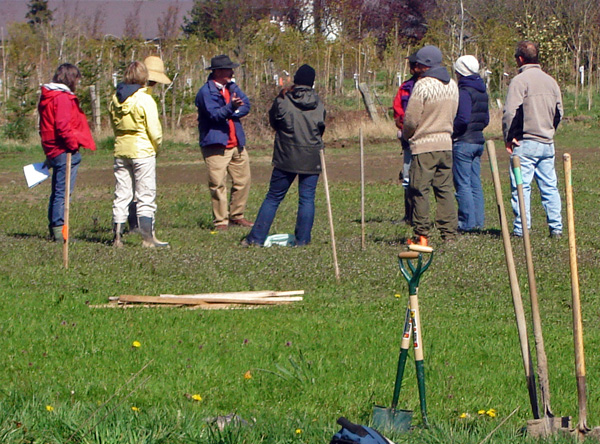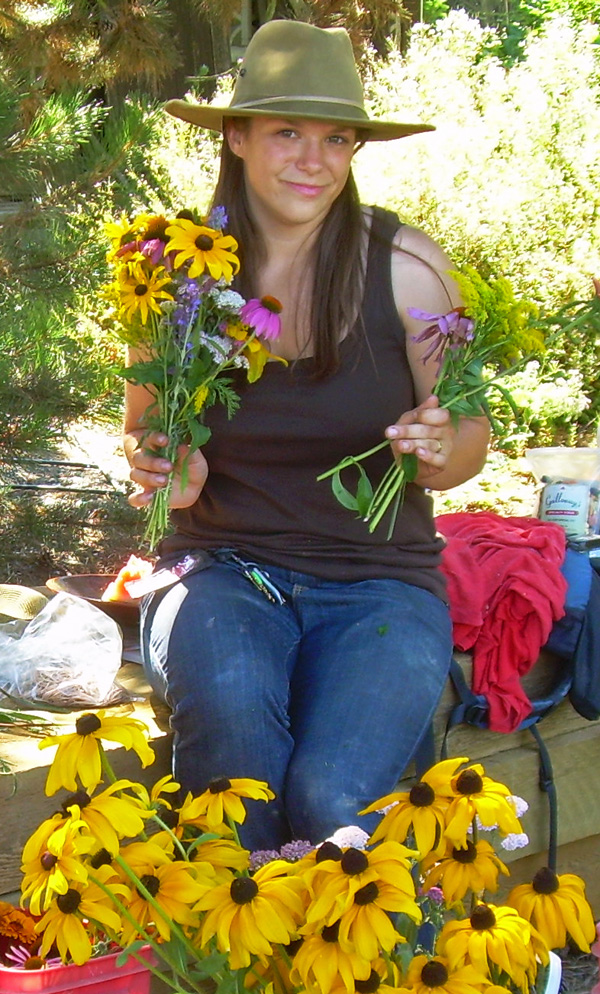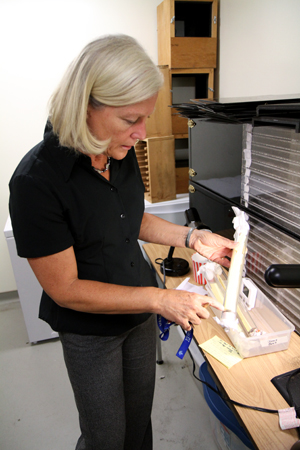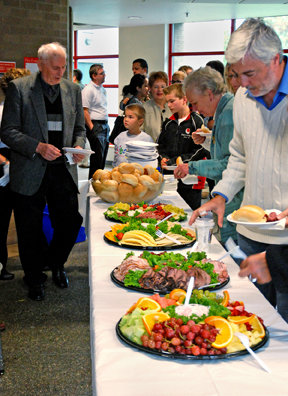Cuban exchange teaches more than academics
February 27, 2011 by Jeffrey Yip · Leave a Comment
Alexis Wiessler believes we have a lot to learn from Cuba.
Wiessler, a horticultural student, was one of six students who went to Cuba in October 2010, through an exchange program with the Institute for Sustainable Horticulture, to participate in field research at the University of Sancti Spiritus.
“I just thought going to Cuba and seeing how they do things would be really beneficial to my career further down the road,” she said.
Cuba is a leader in sustainable farming practices, which is using more environmentally friendly techniques to grow crops. Wiessler and some of her colleagues worked on a project using a fungus to fight different plant diseases. They also used plants to attract insects that are natural enemies of other insects that are harmful to crops.
Overall, she believed the research went well, but they did have some problems.
“There were always pigs and goats and turkeys in the fields eating everything,” she said.
For the 26-year-old, the exchange became more than just about sustainable farming. While she knew living in Cuba would be difficult, nothing could have prepared her for just how different things would be. Cramped living quarters and little variety of food were just a couple of the challenges she faced.
It was her brief glimpse into the lives of everyday Cubans that Wiessler will remember most. She said that despite the hardships the Cubans faced every day, they are still a happy, friendly people who appreciate what little they do have.
“It was really refreshing to see people who have so little just not being affected by it that much,” she said.
The biggest challenge for Wiessler was living in a socialist country. She said things we take for granted, such as freedom of speech, don’t happen in Cuba.
“It was kind of scary at times, because we didn’t really know if we were overstepping any bounds,” she said.
As difficult as the exchange was at times, Wiessler doesn’t regret going and encourages other students to go on similar exchanges and keep an open mind about new experiences.
“I always knew we were lucky in North America, but it’s totally a different thing living in another country and really see how lucky we are,” she said. “As hard as it was, I miss it a lot. I started to get really comfortable there.”
Kwantlen looks for greener pastures with farm school
January 30, 2011 by Jeffrey Yip · 1 Comment

Kent Mullinix, director of the Richmond Farm School (centre dark blue jacket and orange sweater), explains orchard planning to students before they plant a pear orchard during the program's first year in 2010. (Photo by Mary Gazetas)
Old McDonald had a farm and so does Kwantlen.
On Feb. 3, the Institute for Sustainable Horticulture will launch the second year of its farm school. The Richmond farm school is an extension education program designed and intended to prepare people to “engage in local-scale, human-intensive” farming. And, according to the farm school director Kent Mullinix, this isn’t an ordinary university program. There are no textbooks, no assignments, no exams and no grades.
“It’s taught offsite and the whole school is in partnership with the City of Richmond. These are all unusual things for Kwantlen,” he said.
The program runs on a not-for-profit, cost-recovery basis: the farm school is completely funded by student fees and grants.
“We got a very generous grant from Vancity. They gave us $50,000, and with it we’re going to procure equipment and, most notably, we hired a farm school coordinator,” Mullinix said.
Anna Rallings is the program’s farm school coordinator and was a student in the program’s first class.
“I really liked working with chickens,” she said. “We built a chicken coop. And this year the new farm school students are going to be hatching chickens.”
Rallings, a graduate of environmental sciences, found that she didn’t like the day-to-day grind of sitting in an office and writing reports.
“I went into the farm school kind of with a blank slate, thinking that maybe one day I’ll farm. And now myself and another student, Charles Wilson, we’ve started our own farm, Natural Urban Growers in Richmond” she said.
The farm school isn’t just about teaching people how to farm.
“Folks of your generation need to understand that their lives are going to change radically. The fossil-fuel-based economy and lifestyle that you now live is going to cease,” Mullinix said.
“Virtually all of the students have already established careers and are fairly accomplished. They were in the farm school because they see sustainability as a preeminent issue.”
According to Mullinix, agriculture now “is absolutely unsustainable.”
The farm school’s goal is to change the way we farm and make it more sustainable. They’ve partnered with the City of Richmond and two Richmond NGOs to put in place various tools and demonstrations of what they call Municipal Enabled and Supported Agriculture or MESA.
“The farm school is a MESA tool,” Mullinix said. “Municipalities in the very near future are going to become very concerned with their agri-food systems, because it’s going to become inextricably linked to the sustainability of their community.
“If we can advance and achieve a sustainable agri-food system, then we can demonstrate to all that sustainability will enhance our lives not detract from them. If we don’t get this one figured out, we are in, as they say where I come from, a heap of trouble,” he said.
Rallings agrees and sees the farm school as an important step to making the world more sustainable.
“There’s a serious need for people to get into agriculture,” she said. “The nature of agriculture is changing because of climate change, but there’s also community development and the demand for local, organic food. The farm school’s really going to help bring people into the industry who might be on the outside and don’t know where they fit.”

Anna Rallings prepares for the Steveston Farmer's Market during the first year of Kwantlen's Richmond Farm School in 2010. Following the program, she and a fellow student started their own farm, Natural Urban Growers, in Richmond. Rallings is also the farm school's coordinator. (Photo by Kimi Hendess)
Sustainability theme for World Food Day at Kwantlen
October 25, 2010 by Hayley Woodin · Leave a Comment
Sustainability was the theme for World Food Day 2010, and while the day has already come and gone, organizers have aimed to have a lasting impact.
On Monday Oct. 18, Kwantlen students and faculty took part in a free United Against Hunger event at the Langley campus.
In addition to food and cake, education was served up by numerous speakers that presented between 9 a.m. and 1:30 p.m.
Among the presenters were Dr. Deborah Henderson, Kwantlen’s Director of the Institute for Sustainable Horticulture, Dave Stark, the director of Langley Food First, and Langley Mayor Peter Fassbender.
The event was sponsored by the university, the Food and Agriculture Organization of the United Nations and the Food For Famine Society, a Langley-based company that sends a food supplement called Cibo to starving children overseas.
Kwantlen’s World Food Day focused on the importance of local sustainability, in keeping with the idea that hunger can be fought at international, national and regional levels. While the event was positive and meant to encourage local action, it did touch on the world’s current environmental situation, which was less than positive.
“Canada is really bad… needing four to six planets to keep our lifestyle alive,” Henderson said to attendees in the school’s auditorium.
The topics discussed included agricultural pollution, healthy living, food production and fair trade.
“It is a moral obligation to feed ourselves,” Henderson continued, before highlighting the benefits to producing food locally.
And, with regards to trade, “We’ve gone past the point that makes sense,” she said, noting that importing food that can be grown here is simply excessive.
Kwantlen’s ISH lab finds a second home in Cuba
September 25, 2010 by Jeffrey Yip · Leave a Comment

Dr. Deborah Henderson showing how trichogramma sibericum, a tiny parasitic wasp, is produced at the Institute for Sustainable Horticulture's research lab. The wasp is used to help control fireworms, an insect pest that attacks cranberries. (Photo by Jeffrey Yip)
While it still hasn’t put its sign up, the Institute for Sustainable Horticulture lab, or ISH lab, is now up and running.
“I’m glad you came a year after opening … because when it opened we had an empty lab,” Dr. Deborah Henderson said.
Henderson has a PhD in entomology from UBC and a post doctorate in medical entomology from the University of Toronto. Before coming to Kwantlen, she had her own company, ES Crop Consulting Limited, a consulting company in agriculture that provided integrated pest management, monitoring services for farmers, and research and field trials in biological control products.
“It took far longer than I had ever thought to get it up and moving. But, we’re pretty functional now.”
While the ISH lab isn’t a teaching facility, its research project are very much integrated with Kwantlen’s School of Horticulture and the Environmental Protection Technology (EPT) program.
And one of the most important collaborations that the ISH lab has with the two programs is a project in Cuba.
Six students headed for Cuban farms
“There’s a food security project in Cuba and a number of field research trials going on there,” Henderson said. “So, we have six student going to Cuba at the end of October to spend three months working on bio control field trials on a cooperative farm. Two of them are EPT students and four of them are horticulture students.”
Henderson hopes to continue this project over the next three years.
“[W]e want to make it a regular program with Cuba, and integrate it into the new degrees that are in the School of Horticulture. So there could very well be in the future, a course that’s offered in Cuba in the winter term. The students would go down and take that course in Cuba and get credit here,” Henderson said.
According to Henderson, Cuba is the world leader in the use of biological controls, that is using fungi, viruses and other insects to control crop damaging insects.
When the Soviet Union collapsed in the early 1990s Cuba lost nearly 90 per cent of its imports, including food and petroleum products. As the country began to starve, the government enlisted the country’s farmers to find a solution to the food shortages. There answer was to turn much of the available space in the cities into organic vegetable gardens. Because the gardens were in the cities, the food was organically grown, with no chemical pesticides. Instead they used bio controls.
“They’re still using chemicals for some production out in the country,” Henderson said.
“So, the project that we’re working on is the conversion of large cooperative farms to ecological methods. And the students are going to be involved in that. [W]e have a 600-hectare farm that has agreed to convert to these ecological methods.”
Working closer to home
Closer to home, the ISH lab is also conducting research with biological controls. The biological controls the ISH lab works on are a naturally occurring part of the ecosystem. The lab isolates them, makes more of them and tests them to see how effective they are in controlling insects that damage food crops.
But, unlike other labs, Henderson wants their research to go one step further and take successful bio control products all the way to commercialization.
“We’ve got to get products in the hands of growers or else our research isn’t benefiting the people that need the research done,” Henderson said.
A major part of the lab’s work with bio controls has to do with horticultural sustainability. For the ISH lab, achieving sustainability will also focus on how climate change will affect food production, and looking into new production systems that are closer to market will reduce the use of fossil fuels to bring products from far away.
“We are very unsustainable as a species. We have to become sustainable. So any time we can replace unsustainable practices we’re a step towards that goal. And so my particular expertise and experience is doing exactly that,” Henderson said.
“[W]e are going to have to face the reality of climate change. We have a responsibility to take care of our own food security. How can we help anybody else when we can’t feed of ourselves. And right now we don’t feed of ourselves.”
British Columbians ‘want sustainable food production’
According to Henderson, only four per cent of B.C.’s land is arable, that is land that can be used for growing crops. But, Henderson believes British Columbians are sensitive to food security issues and want food production to be sustainable.
“I think we are in great shape. [W]e grow close to 250 crops in B.C. already. So, in that sense we have a pretty big advantage over the Prairies for instance,” Henderson said.
“Quite honestly I think there’s a big social benefit to growing your own food close to home and knowing where your food comes from … and not being so divorced from it that you think it comes from a grocery store.”
As part of being sustainable, the lab itself is doing its part.
“It’s a beautiful facility. It’s been made to be as energy efficient as possible. We’ve applied for LEED certification on it, that’s a designation for environmentally friendly buildings,” Henderson said.
The lab has two sides: microbiology, where they do the research on fungi, and entomology, where they do research with insects and insect viruses. The lab also has production facilities for making fungi and rearing predator and parasitoid insects.
Overall, Henderson seems pleased with the progress the lab has made over the past year, especially in its collaboration with Kwantlen’s horticulture and EPT programs.
“The kind of things we do now with students, I’ve written internships into all of our research proposals,” said Henderson.
“So many of our programs are applied focused … so our research is [also] applied focused. And they enhance each other.”
“We’ve got a little turf project where we’re going to look at compost on turf and so I’m going to communicate with the turf instructors to say, ‘Would you like to get your students involved? Here’s what I have in mind. Do you have any better ideas?’ And we’ll do it with them so that students can be involved.”




